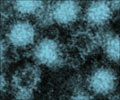Norovirus that has received little attention from researchers has been discussed in a review article published in Trends in Molecular Medicine.

‘Norovirus is a contagious stomach bug which has no specific treatment and is particularly dangerous in infants and the elderly.’





1. People can shed norovirus for months.Norovirus has a high tolerance for disinfectants and with an average 1.2-day incubation period, it can spread quickly. Although symptoms such as abdominal pain, nausea, vomiting, and diarrhea typically resolve within one to four days, it is also possible for a person to shed the virus before symptoms appear and after their resolution. Viral shedding can occur for up to a few months in healthy individuals and for years in immunocompromised patients. The severity of symptoms does not correlate with Norovirus shedding, which makes protection against the virus rather difficult.
2. In a norovirus hot zone? Wash your hands.
Norovirus thrives in crowded public areas. Outbreaks spread when people eat or drink contaminated food, touch infected surfaces, or come into contact with someone shedding the virus. "Norovirus is extremely contagious and so washing your hands frequently is important," says review co-author Megan Baldridge, a physician studying pathogens and the microbiome at the Washington University School of Medicine in St. Louis. "If you start to feel symptoms, avoid preparing food for other people and be careful to clean any surfaces that might be contaminated with bleach."
3. Some people are more susceptible to norovirus than others.
Advertisement
4. Norovirus can trigger other gut problems.
Advertisement
5. There is no vaccine, but new strategies are on the horizon.
Vaccine and treatment research has been limited because of a lack of understanding of norovirus within humans, but recent discoveries in mice have identified that certain biological factors can slow down or kill the virus. "Up until now vaccines have exclusively been using virus-like particles, but some new developments may make it possible to generate a live attenuated vaccine, which is pretty exciting," Baldridge says. "Having animal models and cell culture models to grow the virus and study how it acts a little more closely will help us better understand the virus and also think more about vaccination strategies."
Source-Eurekalert









